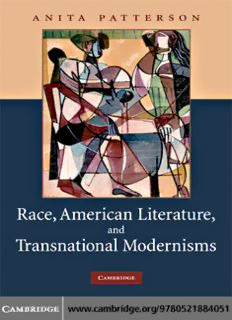
Race, American Literature and Transnational Modernisms PDF
Preview Race, American Literature and Transnational Modernisms
This page intentionally left blank RACE, AMERICAN LITERATURE AND TRANSNATIONAL MODERNISMS Modern poetry crossed racial and national boundaries. The emer- gence of poetic modernism in the Americas was profoundly shaped by transatlantic contexts of empire-building and migration. In this ambitious book, Anita Patterson examines cross-currents of influ- ence among a range of American, African-American and Caribbean authors.WorksbyWhitman,Poe,Eliot,Poundandtheiravant-garde contemporaries served as a heritage for black poets in the USA and elsewhereintheNewWorld.Intracingtheseconnections,Patterson arguesforarenewedfocusoninterculturalandtransnationaldialogue inmoderniststudies.Thisboldandimaginativeworkoftransnational literaryandhistoricalcriticismsetscanonicalAmericanfiguresinfasci- natingnewcontextsandopensupnewreadingsofLangstonHughes, Derek Walcott and Aime´ Ce´saire. This book will be of interest to scholars of American and African-American literature, modernism, postcolonialstudiesandCaribbeanliterature. anita patterson isAssociateProfessorofEnglishandAmerican StudiesatBostonUniversity. cambridge studies in american literature and culture Editor RossPosnock,ColumbiaUniversity FoundingEditor AlbertGelpi,StanfordUniversity AdvisoryBoard AlfredBendixen,TexasA&MUniversity SacvanBercovitch,HarvardUniversity RonaldBush,St.John’sCollege,UniversityofOxford WaiCheeDimock,YaleUniversity AlbertGelpi,StanfordUniversity GordonHutner,UniversityofIllinois,Urbana–Champaign WalterBennMichaels,UniversityofIllinois,Chicago KennethWarren,UniversityofChicago Recentbooksinthisseries 154. elizabeth renker TheOriginsofAmericanLiteratureStudies:AnInstitutionalHistory 153. theo davis Formalism,Experience,andtheMakingofAmericanLiteratureinthe NineteenthCentury 152. joan richardson ANaturalHistoryofPragmatism:TheFactofFeelingfromJonathan EdwardstoGertrudeStein 151. ezra f. tawil TheMakingofRacialSentiment:SlaveryandtheBirthoftheFrontier Romance 150. arthur riss Race,Slavery,andLiberalisminNineteenth-CenturyAmericanLiterature 149. jennifer ashton FromModernismtoPostmodernism:AmericanPoetryandTheoryinthe TwentiethCentury 148. maurice s. lee Slavery,Philosophy,andAmericanLiterature,1830–1860 RACE, AMERICAN LITERATURE AND TRANSNATIONAL MODERNISMS ANITA PATTERSON CAMBRIDGEUNIVERSITYPRESS Cambridge, New York, Melbourne, Madrid, Cape Town, Singapore, São Paulo Cambridge University Press The Edinburgh Building, Cambridge CB28RU, UK Published in the United States of America by Cambridge University Press, New York www.cambridge.org Information on this title: www.cambridge.org/9780521884051 © Anita Patterson 2008 This publication is in copyright. Subject to statutory exception and to the provision of relevant collective licensing agreements, no reproduction of any part may take place without the written permission of Cambridge University Press. First published in print format 2008 ISBN-13 978-0-511-39509-3 eBook (NetLibrary) ISBN-13 978-0-521-88405-1 hardback Cambridge University Press has no responsibility for the persistence or accuracy of urls for external or third-party internet websites referred to in this publication, and does not guarantee that any content on such websites is, or will remain, accurate or appropriate. Contents Acknowledgments page vi Introduction.TowardsacomparativeAmericanpoetics 1 1 TransnationaltopographiesinPoe,EliotandSt.-JohnPerse 9 2 HybridityandtheNewWorld: Laforgue,EliotandtheWhitmanianpoeticsofthefrontier 43 3 FromHarlemtoHaiti: LangstonHughes,JacquesRoumainandtheavant-gardes 93 4 SignifyingmodernisminWilsonHarris’sEternitytoSeason 130 5 Beyondapprenticeship: DerekWalcott’spassagetotheAmericas 160 Epilogue 184 Notes 186 Bibliography 218 Index 235 v Acknowledgments I amgrateful to the many people who made this book possible. Thanks first to Christopher Ricks, Werner Sollors, Bonnie Costello, John Paul Riquelme, Larry Breiner, and Jahan Ramazani, as well as Ronald Bush, Larry Buell, Cristanne Miller, Susan Mizruchi, Maurice Lee and James Winn who generously offered responses to chapter drafts. The transla- tions,andanyerrorsinthemoranywhereelseinthesepages,aremyown. I amalso grateful to Derek Walcott for granting me an interview, and to my fellow Americanists and other colleagues at Boston University for theirinspiration,advice,andfriendship.InadditionIwouldliketothank mystudentsatBostonUniversityfortheirquestionsandinsight,andthe Humanities Foundation for funding that brought the project to fruition. ThanksalsotoRayRyanatCambridgeUniversityPressfortakinginterestin thebook,toserieseditorRossPosnockforhiscontinualsupport,toJoanna Breeze and Maartje Scheltens for help through all phases of production, to Leigh Mueller for her meticulous copy-editing, and to my anonymous readers, whose superb suggestions fundamentally reshaped my argument. SectionsofthebookwerepresentedattheModernistStudiesAssociation, theInternationalAmericanStudiesAssociation,andattheAmericanStud- ies Program at Doshisha University in Kyoto. I am indebted to all who contributedtothesecollegialoccasions.Partofchapter4appearedindif- ferentfrominTheJournalofCommonwealthLiterature,andisreproduced bypermissionofSagePublicationsLtd. I dedicate this book to my husband Orlando, whose love I will always cherish,andtoourdaughterKaia,borninthemidstofmyrevisions,who hasbroughtsucheverlastingjoyandhope. vi Introduction Towards a comparative American poetics “Thosecountries,”saysT.S.Eliot,“whichsharethemosthistory,arethe most important to each other, with respect to their future literature.”1 The purpose of this book is to examine how shared history – of colonial settlement, empire-building, slavery, cultural hybridity and diasporic cos- mopolitanism – informed the emergence, and revisionary adaptation, of modernistidiomsintheAmericas. James Clifford reminds us that the global practice of migration is very old and widespread.2 Still, critics such as Amy Kaplan, Betsy Erkkila and JohnCarlosRowehavesuggestedthattheformationofAmericanliterature shouldbeexaminedinlightofthediasporicconsequencesandmultilingual contexts of imperialism.3 Sensitive to the constructed nature of national myths,Americanistsareevermorealerttotheneedforanalyticalperspec- tivesthatsituateUnitedStatesculturesinatransnationalframework. Withinsociology,theterm“transnationalism”has,sincethemid-1990s, beenusedtodenotesocialprocessesinvolvedinthemovementofmigrant populationsfromonenation-statetoanother,processesthatcallintoques- tion the geographical delineation of national boundaries.4 In 1993, Paul Gilroynotedhowattentionto“transnationalstructuresofcirculationand intercultural exchange” brought about by diasporic history could help diminish the “tragic popularity of ideas about the integrity and purity of cultures.”5 Sevenyearslater,AmritjitSinghandPeterSchmidtannounced the arrival of a “transnational moment” in literary scholarship, where the analytical frameworks of postcolonial and ethnic studies are being pro- ductivelyconfrontedwithoneanother.Therevelationofsharedhistories, they insist, calls for new comparative studies of diasporic identities across nationalboundaries.6 Such renewed interest in comparative methodologies has already con- tributed a great deal to American Studies, helping critics uncover hidden nationalist agendas and move beyond regional ethnocentrism.7 I want to push this argument further, though, by studying how transnationalism 1 2 Race,AmericanLiteratureandTransnationalModernisms informs our understanding not just of “black,” “postcolonial” or “ethnic” writers, but of American modernism more generally. Certainly, as Homi Bhabha contends, we should bear in mind crucial discrepancies among variousmanifestationsofcosmopolitanism,andthesufferingofthosewho wereforcedtomigratetotheNewWorld.8ButRoweisalsorighttosuggest that many people, not just slaves and exploited migrants, were dislocated byimperialism;toforgetthis,heargues,wouldoccludethedenselyinter- wovenandvariegatedhistoriesoutofwhichthesenewglobalphenomena arose.9 With regard to the United States, the story of these historic uproot- ingshasbeentoldmanytimesbefore.10 TheGreatMigrationof1630,the accelerating advance of the western frontier, and the arrival of 35 million transatlanticEuropeanimmigrantsduringthenineteenthandearlytwen- tieth centuries present a vivid backdrop for the sustained, paradoxically fruitful confrontation of disparate national cultures, relations tortuously inscribedinthecontradictorypoeticsofself-identificationonbothsidesof the Atlantic ever since the colonial period. Between 1880 and 1930 alone, 27 million people, mostly from Southern and Eastern Europe, came to America in the hope of escaping starvation, at the same time that many Americansweremigratinginternallytourbanareas,especiallyinthenorth- eastandmidwest. Why did migration remain so consequential for American literature in the twentieth century? The estrangement, alienating aesthetics and cul- tural self-reflexivity of literary modernism involve, as Anthony Giddens has observed, an oscillation between local and global points of view that wasbroughtonbyenhancedmobility.11RaymondWilliamssurmisesthat, because so many artists were immigrants, and experienced their role as “stranger”insuchfundamentallynewways,migrationservedasanimpor- tantcatalystofmodernistandavant-gardemovements.12Wonderingatthe vastscaleandconsequencesofNewWorlddiasporichistory,andonlyhint- ingatitspossibleeffectontheoddlymeasuredcadencesofAmericanverse, HenryJamesambivalentlyquestionedtheverymeaningandpossibilityof nationhood:“Whoandwhatisanalien,whenitcomestothat,inacountry peopledfromthefirstunderthejealouseyeofhistory?–peopled,thatis, by migrations at once extremely recent, perfectly traceable and urgently required...WhichistheAmerican,bythesescantmeasures?”13 Theopeningchaptersofthisbooklayafoundationforthosewhichfol- low by establishing a context for Eliot’s transnational self-conception as a NewWorldpoet.TracingalineofdevelopmentfromPoeandWhitman,to JulesLaforgue(whowasborninUruguay),toEliotandtheGuadeloupean
Description: